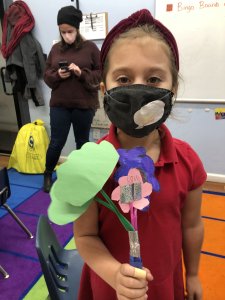When have you received praise? What was that like? How is that experience connected to holiness? Our text last week came from a tefilah (prayer) that said, “You [God] are holy, your name is holy, and holy ones praise your name every day” (Siddur Ashkenaz, Amidah).
Here’s how the Garinim (kindergartners) unpacked it.
What’s it like to experience praise, either to give it or to receive it?
- They feel kind of the same.
- Both feel good.
- Praise never makes me feel bad.
- Makes me happy.
When do people praise God?
- When we sing.
- On Shabbat.
To practice giving and receiving praise, our kiddos made bouquets of paper flowers and wrote encouraging and complimentary notes on them. They had those flowers to hold onto for themselves or to offer to each other.
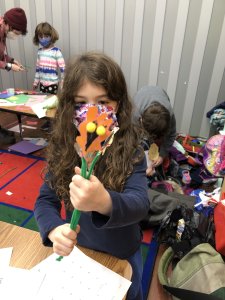
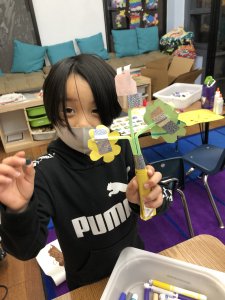
God has lots of names that people use in different moments – names for when we’re asking for something, names for when we’re imagining God protecting us, names for when we’re thinking about God relative to all other Gods, names we don’t even know how to pronounce. What makes God’s name holy?
- Because it’s super!
- Everyone knows it.
- Because it’s like a crown.
- Because God is holy, but also God is holy because God’s name is holy. They make each other holy.

Just like God, we have lots of names too: first names, middle names, last names, full names, shortened names, pet names, nicknames, names that only our parents use, names that we only hear when we’re in trouble or when we’ve done something important. Are any of your names holy? What makes them holy?
- My name is holy because it has God’s name in it – twice!
- My mom sometimes calls me “Beanie” and my sister “Tiger” and those are holy nicknames because they’re from my mom and also because beans and tigers are real things.
- Everyone’s name is holy because everyone is a different subject.
- Everyone’s name is holy because all of our names are beautiful. My name is holy because it’s beautiful too!
Our learners had the opportunity to demonstrate the holiness of their names through visual art. They wrote their names in Hebrew and English and then decorated around them with colors, shapes, and images of the things that make them and their names holy and unique.
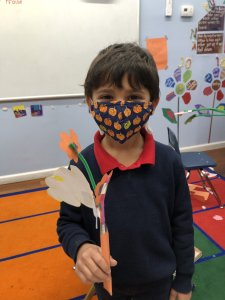
On Monday, Shorashim (1st and 2nd graders) started with a game where each kid got a chance to praise one other kid in the group, picked at random. We talked about our feelings on giving and receiving praise. Some kids don’t always like getting praise, finding it awkward, uncomfortable, or embarrassing, or worry about parts of them being shared that they don’t want shared. However, others enjoy giving and receiving praise. When we get praise, Shorashim preferred saying “thank you”.
There were a range of opinions on whether giving praise (to God or anything/anyone else) is holy. Most kids agreed with the statement that they would rather receive praise from a neighbor than from a stranger. Most disagreed with the statement that praising God or something bigger feels important to them. We noted other possible non-verbal forms of praise, like the “I love you” sign in sign-language.
On Tuesday, we read the book “Your Name is a Song.” Most kids in Shorashim shared that they have had their name mispronounced at one time or another. We then went around and sang our names to the class.
We considered what’s in a name:
- A capital letter (which might show that it is important)
- History (for example, being named after another person)
We then considered why names are holy:
- They are unique
- They are connected to the people who are called by them, and all people are holy
- Without them, conversation would be very confusing as we wouldn’t know who was talking to whom.
On Wednesday, Shorashim watched an episode of the Netflix show, “City of Ghosts”, an animated kids show about a Ghost Club run by kids. Their adventures take them all around Los Angeles and they interview ghosts and spirits and learn about their city’s history. In this episode, the Ghost CLub goes to the park and meets Jasper, who hears a voice in the trees. Later they learn about the Tongva, Indigenius people of Los Angeles.
Kids discussed what was holy to the Tongva people:
- Their language
- Music
- Acorns
- Water
Throughout the week, kiddos explored the holiness of names. They had the opportunity to create an “About My Name” project. Thanks to our Shorashim parents who gave us an abundance of information about their kiddo(s)’ names, they were able to make art depicting the holiness of their name.
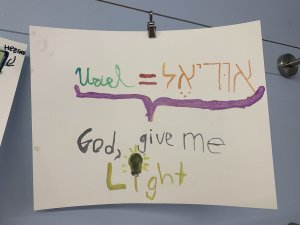
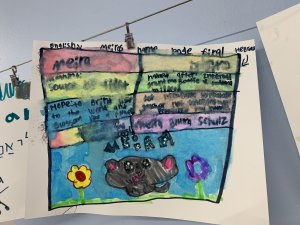
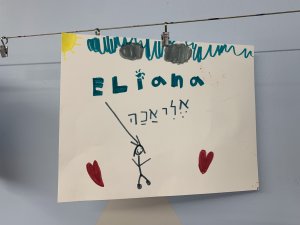
This week, Nitzanim (3rd, 4th, and 5th graders) came to different understandings of the meaning of holiness and how holiness shows up in our lives. For our showcase this unit, Nitzanim will be exploring the holiness in ourselves and our communities by using the ritual of the Tu B’shevat seder. We reflected on how rituals or traditions make us holy.
Here are some of those ideas:
- Shabbat is a ritual that is an opportunity for us to appreciate the holiness of God and rest
- Playing video games after school as a way to unwind is a holy activity
- Having alone time to recharge is important
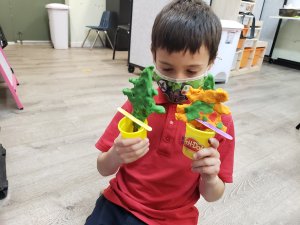
Each kiddo will create their very own Tu B’Shevat seder plates! Just as the fruits we eat at Tu B’Shevat symbolize greater ideas, the elements they will be creating will symbolize different aspects of their own holiness. With the Tu B’Shevat seder as a guide, we’ve started to brainstorm what time of items – fruit or not – will be included to demonstrate what makes Nitzanim, Nitzanim!
Continuing our discussion about the text from the Amidah, we considered what makes a name holy. We took a closer look at the origins in our names and shared the story of how our names came to be! Learning more about the histories and meanings of our names was a wonderful opportunity to celebrate one another. 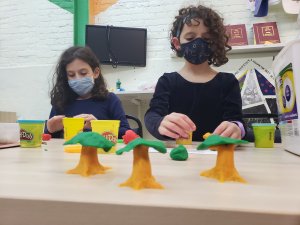
On Wednesday, we reflected on the difference between doing things together versus alone. With a couple rounds of the “human knot” where learners joined hands in a giant knot and were tasked with untangling themselves, we considered if it was easier for one person to guide everyone or if it was more efficient to work through the challenge together. We then considered if other activities are done best alone or with others, including Tefilah!
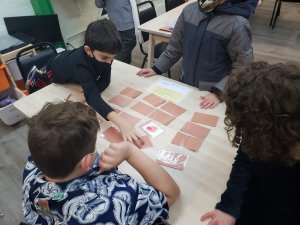
We can’t wait to continue this unit in the new year! We wish everyone a joyous, restful, and safe break, New Year, and Merry Christmas to our families that celebrate.

